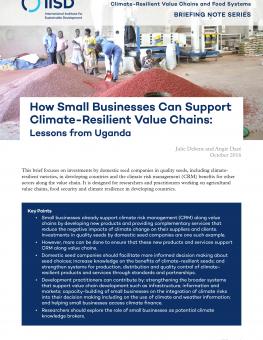
How Small Businesses Can Support Climate-Resilient Value Chains: Lessons from Uganda
This brief focuses on investments by domestic seed companies in quality seeds, including climate-resilient varieties, in developing countries and the climate risk management benefits for other actors along the value chain. It is designed for researchers and practitioners working on agricultural value chains, food security and climate resilience in developing countries.
Small businesses in developing countries already support climate risk management (CRM) along value chains by developing new products and providing complementary services that reduce the negative impacts of climate change on their suppliers and clients.
Investments in quality seeds by domestic seed companies are one such example. However, more can be done to ensure that these new products and services support CRM along value chains.
Domestic seed companies should facilitate more informed decision making about seed choices; increase knowledge on the benefits of climate-resilient seeds; and strengthen systems for production, distribution and quality control of climate-resilient products and services through standards and partnerships.
Development practitioners can contribute by: strengthening the broader systems that support value chain development such as infrastructure, information and markets; capacity building of small businesses on the integration of climate risks into their decision making (including on the use of climate and weather information); and helping small businesses access climate finance.
Researchers should explore the role of small businesses as potential climate knowledge brokers.
You might also be interested in
Enabling Climate Risk Management Along Agricultural Value Chains: Insights from the rice value chain in Uganda
This briefing note proposes a framework of core functions for climate risk management (CRM) along agricultural value chains and highlights the role of service providers in supporting CRM efforts.
Promoting an Integrated Approach to Climate Adaptation: Lessons from the coffee value chain in Uganda
Financial Services for Climate-Resilient Value Chains: The case of the Centenary Bank in Uganda
This briefing note presents the results of case study research on financial services and climate risk management along agricultural value chains, focusing on the Centenary Bank’s services to rice value chain actors in Eastern Uganda.
Policy Solutions for Climate-Resilient Agricultural Value Chains
Climate change poses serious risks to agriculture in many developing countries.